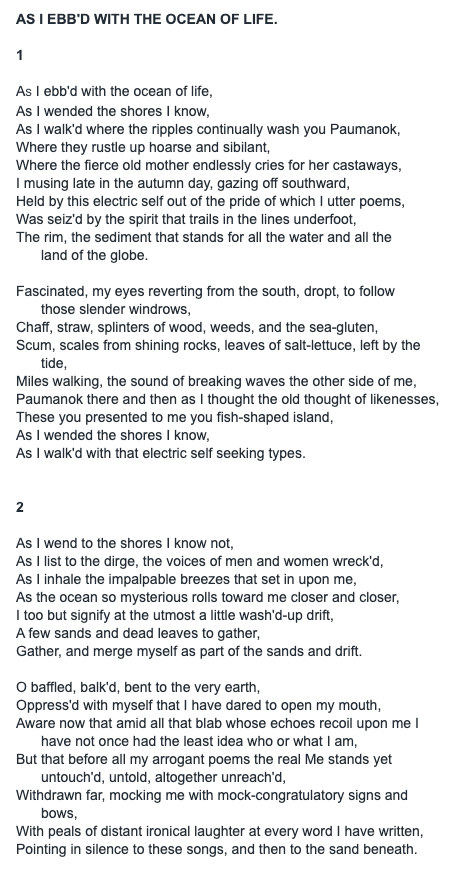Good morning language dweeb Tweeps! Yesterday we discussed two kinds of repetition used as a rhetorical device: epizeuxis and epimone, the simplest forms. Consecutive repetition of words/phrases. Today we will explore the fascinating world of anaphora.
1/?
1/?
Anaphora is repetition of a word or phrase or construction at the beginning of successive phrases, clauses or sentences.
CAVEAT EMPTOR: it is very easy to get lost in anaphora& #39;s seductive thrall & end up in the land of cliche. Tread lightly and carefully.
2/?
CAVEAT EMPTOR: it is very easy to get lost in anaphora& #39;s seductive thrall & end up in the land of cliche. Tread lightly and carefully.
2/?
Anaphora is powerful because it establishes a seductive rhythm that keeps the reader/listener engaged while establishing a thematic anchor, whether it& #39;s MLK& #39;s "I have a dream" or the proactive "We shall" so typical of political speech.
3/?
3/?
The fun part of creating a pattern or expectation for the reader through repetition, of course, is messing with it with it once it& #39;s established. Anaphora can serve as emphasis or it can lead to an even more powerful emphasis by breaking the repetition.
4/?
4/?
"anaphora" is Greek for "carrying up or back" and it& #39;s used to great effect in Chaucer& #39;s Troilius and Criseyde.
Swich fyn hath, lo this Troilus for love!
Swich fyn hath al his grete worthynesse!
Swich fyn hath his estat real above... and so on and so on.
5/?
Swich fyn hath, lo this Troilus for love!
Swich fyn hath al his grete worthynesse!
Swich fyn hath his estat real above... and so on and so on.
5/?
That& #39;s the simplest form, the repetition of a phrase at the beginning of successive sentences.
But you can also repeat a subject and change the accompanying verb, which is pretty cool.
6/?
But you can also repeat a subject and change the accompanying verb, which is pretty cool.
6/?
"I say to you that if you rear yourself against it, you shall fall, you shall be bruised, you shall be battered, you shall be flawed, you shall be smashed." Dickens, Bleak House.
7/?
7/?
Or, from the same novel, anaphora can also be repetition of of the subject and verb with different objects:
"They wanted wearing apparel, they wanted linen rags, they wanted money, they wanted coals, they wanted soup, they wanted interest..." etc.
8/?
"They wanted wearing apparel, they wanted linen rags, they wanted money, they wanted coals, they wanted soup, they wanted interest..." etc.
8/?
Dickens also uses anaphora to switch focus:
"I was in mortal terror of the young man who wanted my heart and liver; I was in mortal terror of my interlocutor with the ironed leg; I was in mortal terror of myself, from whom an awful promise had been extracted..."
9/?
"I was in mortal terror of the young man who wanted my heart and liver; I was in mortal terror of my interlocutor with the ironed leg; I was in mortal terror of myself, from whom an awful promise had been extracted..."
9/?
That last one is effective in Great Expecations because poor young Pip has just met the prisoner and is seriously FREAKED OUT, at first by the prisoner, and then by himself, that he has promised to bring the prisoner food and will have to see him again.
10/?
10/?
Switching anaphora up like that shocks the reader a little and makes him/her pay attention. Lull the reader, shake the reader. Lull the reader, shake the reader. Fun stuff.
11/?
11/?
I love the nearly complete repetition here save for the most important word in each sentence:
"Was ever woman in this humour woo& #39;d?
Was ever woman in this humour won?" (Shakespeare, Richard III)
12/?
"Was ever woman in this humour woo& #39;d?
Was ever woman in this humour won?" (Shakespeare, Richard III)
12/?
"It was he who set the guards on to Winston and who prevented them from killing him. It was he who decided when Winston should scream with pain, when he should have a respite, when he should be fed, when he should sleep, when the drugs should be pumped into his arm. (cont)
13/?
13/?
"...It was he who asked the questions and suggested the answers. He was the tormentor, he was the protector, he was the inquisitor, he was the friend."
COME ON. In the context of Orwell& #39;s 1984 this lulling, soporific, horrifying, soul-crushing repetition is just perfect.
14/?
COME ON. In the context of Orwell& #39;s 1984 this lulling, soporific, horrifying, soul-crushing repetition is just perfect.
14/?
Use anaphora to heighten contrast. If lots of affirmative sentiments are followed up with one negative, your negative will be that much stronger, for example.
15/?
15/?
I& #39;m headed outside to garden, so I leave you with a bit of Leaves of Grass by Whitman (from http://whitmanarchive.org"> http://whitmanarchive.org )
16/17
16/17
Credit for examples goes to (again) Farnsworth& #39;s Classical English Rhetoric ( @GodinePub), The @penguinusa Penguin Dictionary of Literary Terms and Literary Theory and Holman & Harmon& #39;s Handbook to Literature 6th ed ( @MacmillanUSA).
17/17 Have a great Saturday!
17/17 Have a great Saturday!
Since we focused on repetition at the beginning, tomorrow we will shift to repetition at the end, or epistrophe!
In the meantime, stay safe and well. Jess
In the meantime, stay safe and well. Jess

 Read on Twitter
Read on Twitter


